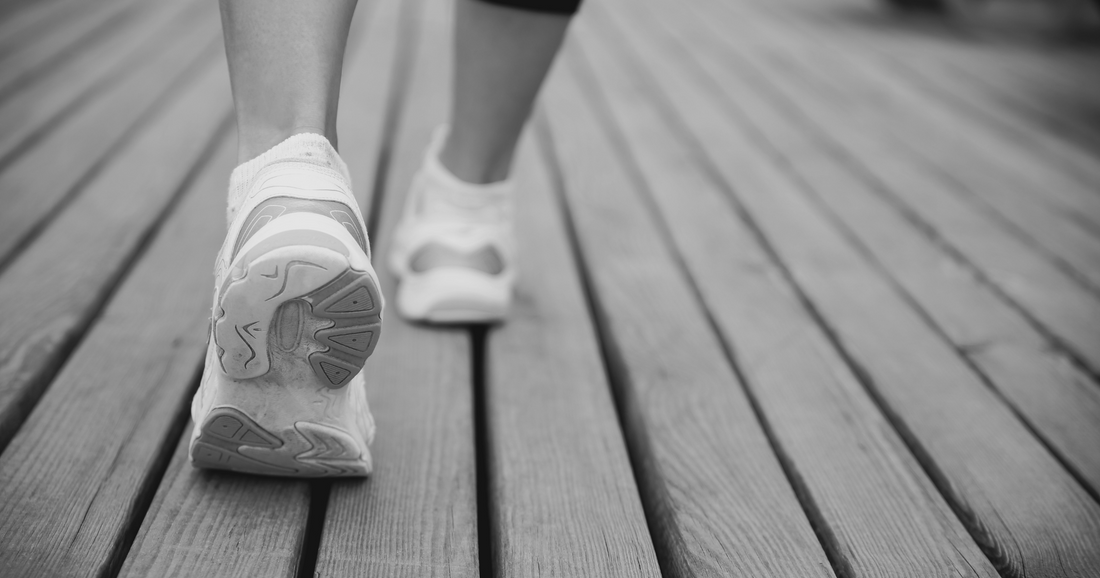
Walking Into Wellness: The Big Benefits of 30 Minutes a Day
Share
In a world full of complex fitness plans and high-intensity workouts, it’s easy to forget one of the simplest paths to better health, walking. You don’t need fancy gear or a gym membership to get moving. Just 30 minutes of walking a day can improve your health, boost your mood, and even help you live longer. If you’ve been looking for an easy way to take control of your wellness, lacing up your shoes and heading outside might be the answer.
Why 30 Minutes Matters
You might wonder if 30 minutes of walking can really make a difference. The answer is yes. According to the Centers for Disease Control and Prevention (CDC) and the World Health Organization (WHO), just 150 minutes of moderate-intensity exercise a week, which breaks down to 30 minutes a day for five days, can lead to major health benefits.
Walking is one of the most accessible forms of moderate-intensity exercise. It’s free, low-impact, and easy to do anywhere. Whether you walk in your neighborhood, at the park, or on a treadmill, you’re making progress.
Physical Health Benefits of Walking
1. Strengthens Your Heart
Walking helps your heart stay healthy. It improves circulation and can lower your risk of heart disease and stroke. Studies show that walking 30 minutes a day can reduce your risk of heart disease by up to 19 percent.
2. Helps With Weight Management
If you're trying to lose weight or maintain a healthy weight, walking can help. It burns calories and supports your metabolism. Walking also makes it easier to stick to a fitness routine since it doesn’t feel as overwhelming as more intense workouts.
3. Reduces Risk of Chronic Illnesses
Regular walking can lower your risk of type 2 diabetes, high blood pressure, and certain types of cancer. It helps your body regulate blood sugar and insulin levels, especially after meals.
4. Boosts Immune Function
Walking helps your immune system stay strong. A study published in the British Journal of Sports Medicine found that people who walked regularly had fewer sick days and less severe symptoms when they did catch a cold.
5. Supports Joint and Bone Health
Walking is gentle on the joints but still helps strengthen the muscles around them. It also keeps your bones strong, which helps prevent osteoporosis and other bone-related issues as you age.
Mental and Emotional Benefits of Walking
1. Reduces Stress and Anxiety
Walking can help you manage stress. When you walk, your body releases endorphins, natural mood boosters. Walking outdoors also allows your mind to rest, especially if you spend a lot of time staring at screens.
2. Improves Your Mood
You don’t have to go far to feel better. Even a short walk can lift your mood. Research shows that walking can help reduce symptoms of depression and improve emotional well-being.
3. Boosts Creativity and Focus
Stuck on a problem or need a mental refresh? A brisk walk can get your creative juices flowing. It helps clear your mind and boosts brain function, making it easier to focus when you return to work or school.
4. Improves Sleep Quality
If you have trouble falling or staying asleep, daily walking might help. Exercise like walking helps regulate your body’s sleep cycle. Just avoid walking too close to bedtime, as it might leave you feeling too energized.
When you commit to walking 30 minutes a day for wellness, the right apparel makes a difference. Built By Battle’s wellness clothing for active walking is designed to keep you comfortable, confident, and focused on your self-care routine. Our motivational apparel for daily movement blends functional design with purpose so you can step into clarity and resilience.
How to Make Walking a Daily Habit
1. Start Small
If 30 minutes feels like too much at first, start with 10 minutes a day. Slowly build up your time each week until you reach your goal. What matters most is consistency.
2. Break It Up
You don’t have to walk for 30 minutes all at once. Try walking for 10 minutes in the morning, 10 at lunch, and 10 in the evening. It all adds up and still provides great benefits.
3. Make It Enjoyable
Listen to music, podcasts, or audiobooks while you walk. Invite a friend, bring your dog, or enjoy the silence. The more you enjoy your walk, the more likely you are to keep doing it.
4. Set a Routine
Try walking at the same time every day to make it part of your routine. Morning walks can give you energy for the day, while evening walks can help you relax before bed.
5. Track Your Progress
Use a pedometer, smartphone app, or fitness tracker to keep track of your steps and time. Watching your progress can help keep you motivated.
Tips for Walking Safely and Comfortably
- Wear comfortable shoes that support your feet and prevent blisters.
- Dress for the weather so you stay comfortable whether it's hot, cold, or rainy.
- Stay hydrated, especially during warmer months.
- Walk in safe, well-lit areas, and be aware of your surroundings.
- Warm up and cool down with a few minutes of slower walking before and after your main walk.
Take It to the Next Level
Once you're comfortable with your 30-minute walk, you can step things up to improve your fitness even more.
1. Add Intervals
Alternate between slower walking and faster bursts. This gets your heart rate up and burns more calories without needing to run.
2. Try Different Terrains
Walk uphill, on trails, or on grass to engage more muscles. Walking on varied surfaces can also improve your balance and coordination.
3. Add Light Weights
Use small hand weights or wear a weighted vest to add resistance. This helps build strength and burn extra calories.
Walking Is for Everyone
One of the best things about walking is that almost anyone can do it. You don’t need to be an athlete or have a certain body type. Whether you're 15 or 75, walking can improve your health.
Even if you have joint issues or other health concerns, walking is often still safe. Just check with your doctor before starting if you have any serious conditions.
Walking and Mental Wellness
In today’s fast-paced world, walking also offers a break for your mind. Taking a walk without your phone or distractions gives you time to reflect, breathe deeply, and connect with yourself. This can be a powerful form of mindfulness, which is proven to reduce stress and improve emotional health.
Even walking in nature, like a park or trail has added benefits. Studies show that being in green spaces can lower your blood pressure, reduce anxiety, and help you feel more positive.
Getting the Whole Family Involved
Walking is a great way to connect with others. Bring your family, kids, or partner along. It gives you a chance to talk and bond without screens or other distractions. You’ll build healthy habits together, and it’s a fun way to spend time as a group.
You can even turn walks into small adventures. Try new routes, visit a local trail, or explore a different part of your neighborhood. It keeps things exciting and gives everyone something to look forward to.
Final Thoughts
You don’t need to overhaul your life to feel healthier, happier, and more energized. Just 30 minutes of walking each day can bring real change. It’s simple, effective, and accessible to almost everyone.
Whether you're walking for your heart, your mind, or just a break from the screen, every step counts. The journey to better health doesn't have to be hard. It starts with one step — and then another.
So what are you waiting for? Put on your shoes, step outside, and walk into wellness.
